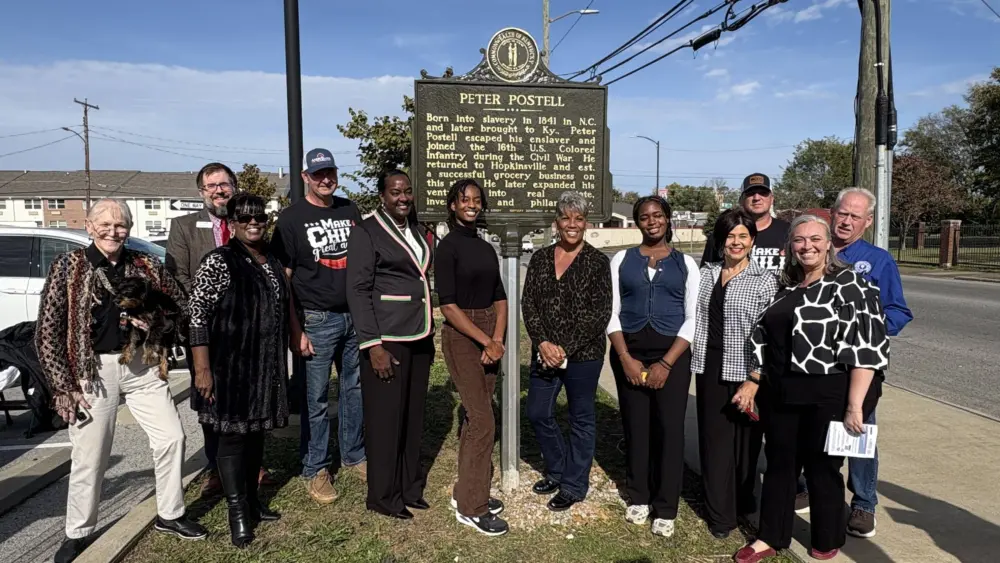
Community leaders, descendants, and historians gathered in downtown Hopkinsville to honor the life and legacy of Peter Postell, a man born into slavery who went on to become one of the city’s most successful businessmen and a symbol of perseverance and faith.

The ceremony, held on the site where Postell’s grocery store once stood, marked the unveiling of a Kentucky Historical Marker recognizing his contributions to Hopkinsville’s economic and cultural history.
“This project has been in the works since 2018,” said Peg Hays, chair of the Local Development Corporation, which owns the property. “It’s proof that when determination and perseverance are at the forefront of those who value our history and honor those who’ve made significant impacts on our community, we always have success in Hopkinsville.”
The Local Development Corporation partnered with the Kentucky Historical Society, the City of Hopkinsville, and the Kentucky Transportation Cabinet to bring the project to fruition after years of delays caused by the pandemic and other factors.

Hopkinsville Mayor James R. Knight Jr. called it “a joy to be here today and honor a man whose story is a powerful part of Hopkinsville’s history so we never forget it.”
“Mr. Postell’s life reminds us what possibility with courage met with opportunity means,” Knight said. “His story is one of resilience, faith, and dedication to our community here in Hopkinsville and Christian County.”
Alissa Keller, executive director of the Museums of Historic Hopkinsville-Christian County, shared Postell’s story in detail, recounting how he lost his grocery business in the great downtown fire of 1882 but reopened within days and rebuilt stronger than before.
“Within the next year, Peter Postell had built one of the most handsome blocks in the city,” Keller said. “He provided resources and services for his community, for this community… and he did all this during a time of severe division and segregation.”
Born in Yorktown, South Carolina, in 1842, Postell was sold as a teenager and brought to Hopkinsville before escaping enslavement during the Civil War to join the 16th U.S. Colored Infantry. After the war, he returned to Kentucky, married Pauline Buckner, and became a prosperous grocer and property owner who served both Black and white customers.

At the ceremony, Postell’s descendants traveled from across the country to witness the moment and share their family’s pride. Paula Carter, one of Postell’s great-great-granddaughters, said, “Today is really glorious for us as fifth and sixth generation African Americans who can share the story and point to this historical marker for others to know that he existed and thrived through some of the worst times in our American history.”
Her cousin, Donna Jackson, who journeyed from Mount Vernon, New York, called the dedication “an opportunity that is once in a lifetime.”
“I had to come down. I had to bring my daughters, Zuri and Layla, so that they can understand,” Jackson said. “It’s one thing to gather papers and documents and dig in on Ancestry.com. It’s a whole other thing to know that the Peter Postell legacy and the legacy of his wife and his children and their progeny is still ongoing.”
Jackson said the marker brings “life to the story” and connects their modern-day family to its deep roots. “There are family members in California, in Ghana, in New York, in Philadelphia, in Maryland, in Paducah, Kentucky, who are waiting for us to report back to them,” she said. “They couldn’t be with us today, but they’re here with us in spirit.”
Her daughter, Zuri Jackson, said seeing her ancestor honored publicly gave her a new sense of identity and responsibility. “Seeing my family being represented in such a powerful way… it makes me want to continue on with this information,” she said. “Even now, as an African American, we are struggling to make sure our history is told, to make sure that we are represented. We can’t let this kind of information be thrown away or misconstrued.”
Her younger sister, Layla Jackson, echoed that pride. “Traveling and coming to see a part of my history is very eye-opening,” she said. “It gives me something to connect to and something to feel proud of, and it makes me want to be better, do better, to uplift my ancestors’ names.”
Representing the Kentucky Historical Society, Dr. Charles Welsko spoke about the significance of sharing stories like Postell’s through the state’s historical marker program, which he described as both educational and ongoing.
“When it comes to telling history, it’s important to recognize that history is a process,” Welsko said. “It is people learning more as they discover more documents, and it is a continuing conversation. These markers are there to inspire people to continue talking about history and to continue engaging and learning.”
He explained that each marker is based on evidence gathered by communities — “primary sources, secondary sources that make that case,” he said. “In some ways, the markers are making a case for why this story matters, and that’s a lot of what history is.”
Holly Boggess, the city’s Downtown Renaissance Director, closed the event by thanking those who worked over the years to see the project completed. “Everyone’s played a critical part in assisting us with honoring Mr. Peter Postell and his contributions,” she said.

As the crowd gathered around the new marker, the story of Peter Postell — once enslaved, later one of Kentucky’s wealthiest Black businessmen — took its place among the enduring history of Hopkinsville, a legacy now etched in bronze for future generations to discover.






